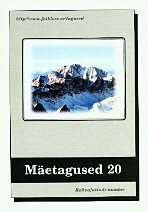Memoraat ja muistend. Mõned metodoloogilised vaatepunktid
Memorate and legend. Some methodological points of view
Author(s): Gunnar GranbergSubject(s): Customs / Folklore
Published by: Eesti Kirjandusmuuseum
Summary/Abstract: The article analyses the differences between a legend and a memorate. A legend is a short narrative of one episode that can have a background partially based on experience and observation but that has not emerged directly from these but instead from concepts of similar nature. Legends are created by people's ability to fabulate, while of special importance is that they have attained a fixed form that leaves little play for individuality. The other form of folk narrative is the memorate, based on individual experience, though the narrative motif may be one of the legend motifs. Legends and memorates influence each other. On the one hand, memorates often take their material from legends or legend motifs. On the other hand, memorates are a good ground for sprouting new legends. Often memorates are polished into part of the heritage, turning into legends in the process. The article views the relations of legend and memorate on the example of Scandinavian forest fairy tradition. Narratives in question range from legends to personal experience narratives. The latter are strongly influenced by folk belief. Thus, a researcher of folk belief needs to first of all study personal experience narratives. There is also a group of memorates that tends to mislead researchers - descriptions of purely personal experiences that thus characterise only the person that experienced the event. Another threat to the researcher is that lacking necessary amounts of material, no reliable conclusions can be reached. Translation based on the German article Memorat und Sage. Einige methodische Gesichtspunkte published in Saga och sed. Gustav Adolfs Akademiens årsbok 1935. Uppsala: A.-B. Lundequistska Bokhandeln, pp 120-127. Translated by Riina Link.
Journal: Mäetagused. Hüperajakiri
- Issue Year: 2003
- Issue No: 20
- Page Range: 44-50
- Page Count: 8
- Language: Estonian

